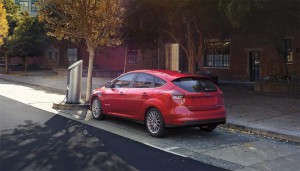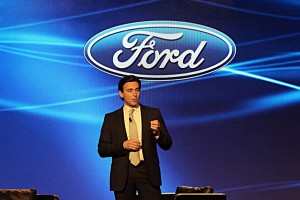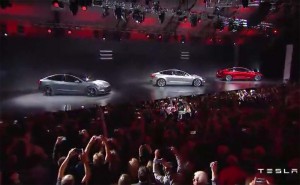Ford Motor Co. plans to join the ranks of automakers offering a battery-car capable of at least 200 miles per charge, said CEO Mark Fields, helping eliminate the so-called “range anxiety” that has many potential customers shying away from electric vehicles.
That’s a shift in strategy for Ford which decided to hold the range of the updated 2017 Focus Electric to just 100 miles. But a growing list of manufacturers are pushing to 200 miles or more, including Tesla, General Motors, Volkswagen and Audi.
“We want to make sure that we’re either among the leaders or in a leadership position,” Fields said during a conference call with automotive analysts and reporters. “When you look at some of the competitors and what they’ve announced, clearly, that’s something we’re developing for.”
(Is this the Faraday Future battery car? Click Here to find out.)
Though it had previously argued that shorter-range vehicles would satisfy consumer demand, Ford has been one of the more aggressive manufacturers entering the battery-car field. It already offers the fully electric Focus EV, as well as plug-in and hybrid variants of other models, such as the C-Max Energi.
And in December, CEO Fields announced plans to invest $4.5 billion to bring 13 more electrified models to market by 2020. It plans to offer them in a number of different markets, including the U.S., Europe and China.
Indeed, the Chinese market is becoming a key focus for industry electrification efforts, reflecting the Beijing government’s push to reduce that country’s endemic smog problems.
But Europe is also pushing for electric vehicles as part of the Continent’s efforts to reduce global warming CO2 emissions. And, in the U.S., there is growing recognition that it will take a mix of hybrids, plug-ins and pure battery-electric vehicles, or BEVs, to meet the 54.5 mpg Corporate Average Fuel Economy standard that will go into effect in 2025.
Initially, the Environmental Protection Agency argued it would be possible to get there with conventional gasoline and diesel powertrain technology, but while, “The gasoline engine can go most of the way,” Mark Cooper, the Director of Research for the Consumer Federation of America, said, “the contribution of EVs to meet the standard may be a lot bigger than people originally thought.”
Fields didn’t provide details on Ford’s plan for a longer-range BEV, so it is unclear how soon it will come to market. Also uncertain is whether it will be a version of one of Ford’s existing vehicles or use an entirely new platform.
The latter is quite likely, according to industry experts, as it may require a new vehicle architecture to squeeze in the requisite batteries – likely something north of 60 kilowatt-hours of lithium-ion cells.
Tesla has sandwiched its batteries into the floor of current products, the Model S and Model X, and will use a similar approach to the upcoming Model 3. The smaller, more affordable vehicle will hit at least 200 miles in base configuration, according to CEO Elon Musk, though longer-range batteries are expected to be offered as an option.
General Motors is using the same, skateboard-like platform for the Chevrolet Bolt battery-car it will launch later this year. It will also deliver 200 miles per charge.
(Reborn Fisker, now Karma, set to build battery car in the U.S. Click Here for the story.)
Both Bolt and Model 3 will carry prices in the mid-$30,000 range before state and federal tax credits. That reflects not only new approaches to manufacturing but the fact that the cost of lithium-ion batteries has been dropping rapidly. GM global product development director Mark Reuss disclosed that the cells in Bolt’s battery pack will cost under $150 per kWh, or less than $9,000 per vehicle. At the beginning of the decade, that would have been closer to $1,000 per kWh.
That sharp drop is making it possible for manufacturers to offer range closer to what a gas-powered car can deliver without a steep premium. But the industry is hoping to push batteries down to $100 or less per kWh, at which time, noted a study by the Boston Consulting Group, an electric vehicle would actually be price-competitive with a conventional car almost immediately, without factoring in energy costs over the life of the vehicle.
Ford CEO Fields’ comments come at a time when automakers are announcing plans for a lot of new battery-cars but are struggling to sell the ones they already have. Demand for plug-based models actually dipped in the U.S. in 2015, largely due to cheap gas, industry analysts say.
“It’s ironic that we’re seeing a new rush to pure EVs with a realistic driving range, even as fuel prices in the U.S. are at record lows,” Kelley Blue Book senior analyst Karl Brauer said. “It will be a true test of the technology.”
Other automakers have hinted they will also be bringing out longer-range models, notably Nissan, which bumped up the range of its Leaf electric vehicle this year to just over 100 miles. Brauer said he expects Honda, Hyundai, Toyota and Volkswagen to lay out similar plans in the near future.
(Fiat Chrysler reportedly talking to Google about autonomous vehicles. Click Here for the breaking story,)



